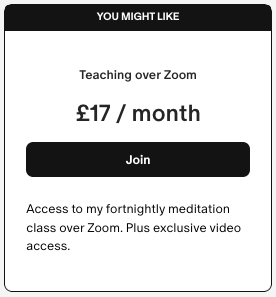Buddhist guilt / remorse
Below is an excerpt from my forthcoming book…
© Mahabodhi Burton
4 minute read
This excerpt is from the chapter on ‘Woke As Old Testament Religion’ and goes into the Buddhist view of guilt
Buddhism and guilt
The Buddhist word associated with anxiety, guilt and remorse is kaukrtya.[1] According to Subhuti,[2] it is of three kinds: general anxiety; genuinely ethical feeling; and neurotic guilt.
General anxiety
Functional kaukrtya or generalized anxiety is a sort of troublesome background noise one experiences in one’s consciousness: an obscure feeling of unease or tension, like the feeling you have when you wake up at night and think, ‘Did I lock the back door before I went to bed?
One could argue that there could be an ethical element to this sort of feeling: because lack of mindfulness becomes negligence; and negligence can cause harm to others. Nevertheless, we would not—on the whole—consider this kind of feeling to indicate a moral misdemeanour, as it does not involve any intention to cause harm, nor to take advantage of anyone. It is more a mental alarm bell that goes off to warn us that we have omitted to do something that needs to be done. And we can respond to it by recognizing it and taking appropriate action to remedy the situation. Sometimes, we realize that there is in fact nothing that we can do about it: and so we might as well relax: there is no point in worrying about the safety of air travel when the plane you are in has already left the ground.
Genuine ethical remorse
We experience ethical kaukrtya or remorse when–in our heart of hearts–we know that we have done harm: when we have offended against our own ethical values.
We only do feel bad (i.e., pain) because our state of mind is what Buddhists call skilful: which mean it is oriented towards, and realizes, the well-being of ourselves and others. This is the kind of wholesome ethical anxiety I mentioned in Chapter 1; in relation to religion. Such remorse leads naturally to personal reparations for any damage that we have caused; and to caution in relation to our current mental states, lest we create further such damage in the future.
Neurotic or irrational guilt
Yet there is also an unwholesome version of ethical anxiety: the kind of kaukrtya that Subhuti terms neurotic or false remorse. In this case our worry is about what people will think. Behind it lies fear of punishment; losing love, acceptance or status.
Buddhism has the concept of near and far enemies: for instance the far enemy of compassion—its opposite—is cruelty: instead of feeling concerned when someone is suffering we feel happy. A near enemy[3] is so called because it looks like the real thing but isn’t. Sentimental pity, then, is the near enemy of compassion, because it is more about the subject’s self-image than the object’s suffering. In the same way, neurotic guilt resembles our natural moral sense, but is actually its near enemy.
Of course, this kind of false remorse / neurotic guilt often has its roots in our conditioning and religious backgrounds (especially in family relationships experienced in childhood).
I alluded to high and low-level religions in Chapter 1. More enlightened religious attitudes focus on personal ethical responsibility and self-awareness, whereas their older versions—think of Old Testament Christianity—focus more on fear of punishment. For many, belief in divine reward and punishment is integral to their religion: they think: who is going to refrain from doing bad things—or care about doing good—if there is no punishment for evil; if people do not believe there is an all-powerful God waiting to punish them if they step out of line, surely they will throw all moral restraint to the winds. It seems that most societies have considered it necessary to frighten the masses into morality—or at least into docility—through these means, but while such terror tactics will achieve a level of social control, they are disrespectful to the individual’s sensibility, and no basis to build an open society upon. The point is that fear of a punishing power has got nothing to do with Buddhist morality as such.
We can go too far the other way though, in combating our neurotic conditioning:
‘One way in which such fear harms us is through seeking to escape it in the wrong way. In trying to get free from the cowed state of dependence arising from our conditioning, we can go too far and start to distrust all feelings of remorse. We may even try to rid ourselves of skilful remorse. Following this logic, we can, if we are not careful, end up doing something immoral for apparently moral reasons–justifying acts of moral rebellion on the grounds that we are breaking free from our conditioning. A lot of unskilful behaviour gets justified on the grounds of ‘authenticity’ or ‘spontaneity.’ A concern to be authentic or spontaneous can be valid of course, but I suspect that sometimes it is a smokescreen for moral laziness, shielding various moral weaknesses such as drug taking, sexual misconduct, harsh speech, or almost any breach of the precepts. Perhaps most of the unskilful things that get done behind this smokescreen are not too serious. Mostly they are just crude. Nevertheless, they can hamper our spiritual progress significantly.’[4]
The secular religions of Woke and Safetyism actively encourage neurotic guilt, which is considered to be highly unskilful in Buddhism. To foster this guilt in others, individuals are encouraged to take offence and proclaim they feel unsafe at any occasion: people are being taught they have a duty to society to maintain and promote what amounts to a postmodern Old Testament commandment: ‘Thou Shall Take Offence from Others.’
However, in any communication there are two sides; and each side has a moral responsibility for the outcome. To tell the truth is morally important, but, equally, to hear the truth whenever the truth is being told is as important; likewise, to not give offence to others is morally important, but, equally, to not take offence when none is intended is as important, as both break the bond of connection between two human beings; therefore, Buddhists try to not take offence.
Obviously the three kinds of remorse require different responses. We should aim to deal with generalized anxiety as and when it arises (See Chapter 9 on ‘Buddhist Practice’). As for neurotic guilt, we need to identify it when it is present; and gradually free ourselves from it. And in terms of genuine ethical remorse, we need to cultivate it because it protects the world from our future wrongdoing.
I go on to explore how, as Woke and Buddhism are effectively competing religions, it is unjust for the US Congress to make a law to compel it.
[1] Pronounced kau-krut-ya.
[2] Subhuti. Remorse and Confession in the Spiritual Community. Free Buddhist Audio.
https://www.freebuddhistaudio.com/texts/othertexts/Subhuti/FBA182_Remorse_and_Confession-Subhuti.pdf
[3] Oliver Burkeman. ‘This column will change your life: near enemies.’ The Guardian. 7 June 2014.
https://www.theguardian.com/lifeandstyle/2014/jun/07/change-your-life-near-enemies-buddhism
[4] Remorse and Confession in the Spiritual Community. p9.







 Users Today : 32
Users Today : 32 Users Yesterday : 23
Users Yesterday : 23 This Month : 490
This Month : 490 Total Users : 13917
Total Users : 13917
